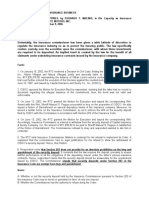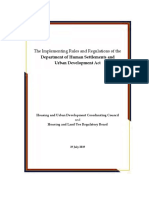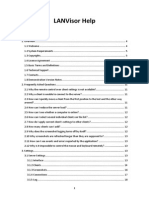0 ratings0% found this document useful (0 votes)
99 viewsGokongwei Case
Gokongwei Case
Uploaded by
Alegria IrisThe petitioner, a stockholder of San Miguel Corp., challenged amendments to the company's by-laws that disqualified competitors from being nominated or elected to its board of directors. The Securities and Exchange Commission denied the petitioner's request to declare the amendments null and void. On appeal, the court upheld the amendments as valid. The court ruled that corporations have broad authority to set board qualifications and amend their by-laws, and that protecting the company's interests by preventing directors from having competing loyalties is reasonable based on fiduciary duty and corporate opportunity principles.
Copyright:
© All Rights Reserved
Available Formats
Download as DOCX, PDF, TXT or read online from Scribd
Gokongwei Case
Gokongwei Case
Uploaded by
Alegria Iris0 ratings0% found this document useful (0 votes)
99 views3 pagesThe petitioner, a stockholder of San Miguel Corp., challenged amendments to the company's by-laws that disqualified competitors from being nominated or elected to its board of directors. The Securities and Exchange Commission denied the petitioner's request to declare the amendments null and void. On appeal, the court upheld the amendments as valid. The court ruled that corporations have broad authority to set board qualifications and amend their by-laws, and that protecting the company's interests by preventing directors from having competing loyalties is reasonable based on fiduciary duty and corporate opportunity principles.
Original Description:
CORPORATION LAW CASE DIGEST GOKONGWEI V SEC
Copyright
© © All Rights Reserved
Available Formats
DOCX, PDF, TXT or read online from Scribd
Share this document
Did you find this document useful?
Is this content inappropriate?
The petitioner, a stockholder of San Miguel Corp., challenged amendments to the company's by-laws that disqualified competitors from being nominated or elected to its board of directors. The Securities and Exchange Commission denied the petitioner's request to declare the amendments null and void. On appeal, the court upheld the amendments as valid. The court ruled that corporations have broad authority to set board qualifications and amend their by-laws, and that protecting the company's interests by preventing directors from having competing loyalties is reasonable based on fiduciary duty and corporate opportunity principles.
Copyright:
© All Rights Reserved
Available Formats
Download as DOCX, PDF, TXT or read online from Scribd
Download as docx, pdf, or txt
0 ratings0% found this document useful (0 votes)
99 views3 pagesGokongwei Case
Gokongwei Case
Uploaded by
Alegria IrisThe petitioner, a stockholder of San Miguel Corp., challenged amendments to the company's by-laws that disqualified competitors from being nominated or elected to its board of directors. The Securities and Exchange Commission denied the petitioner's request to declare the amendments null and void. On appeal, the court upheld the amendments as valid. The court ruled that corporations have broad authority to set board qualifications and amend their by-laws, and that protecting the company's interests by preventing directors from having competing loyalties is reasonable based on fiduciary duty and corporate opportunity principles.
Copyright:
© All Rights Reserved
Available Formats
Download as DOCX, PDF, TXT or read online from Scribd
Download as docx, pdf, or txt
You are on page 1of 3
GOKONGWEI VS.
SECURITIES & EXCHANGE COMMISSION
Facts:
Petitioner, stockholder of San Miguel Corp. filed a petition with the SEC for
the declaration of nullity of the by-laws etc. against the majority members of
the BOD and San Miguel. It is stated in the by-laws that the amendment or
modification of the by-laws may only be delegated to the BODs upon
an affirmative vote of stockholders representing not less than 2/3 of the
subscribed and paid uo capitalstock of the corporation, which 2/3 could
have been computed on the basis of the capitalization at the time of
the amendment. Petitioner contends that the amendment was based on the
1961 authorization, the Board acted without authority and in usurpation of
the power of the stockholders n amending the by-laws in 1976. He also
contends that the 1961 authorization was already used in 1962 and 1963.
He also contends that the amendment deprived him of his right to vote and
be voted upon as a stockholder (because it disqualified competitors from
nomination and election in the BOD of SMC), thus the amended by-laws
were null and void. While this was pending, the corporation called for a
stockholders meeting for the ratification of the amendment to the by-laws.
This prompted petitioner to seek for summary judgment. This was denied
by the SEC. In another case filed by petitioner, he alleged that the
corporation had been using corporate funds in other corps
andbusinesses outside the primary purpose clause of the corporation in
violation of the Corporation Code.
Issue: WON the amendments are valid?
Held:
The validity and reasonableness of a by-law is purely a question of
law. Whether the by-law is in conflict with the law of the land, or with
the charter of the corporation or is in legal sense unreasonable and
therefore unlawful is a question of law. However, this is limited where
the reasonableness of a by-law is a mere matter of judgment, and
one upon which reasonable minds must necessarily differ,
a court would not be warranted in substituting its judgment instead of
the judgment of those who are authorized to make by-laws and who
have exercised authority. The Court held that a corporation has
authority prescribed by law to prescribe thequalifications of directors.
It has the inherent power to adopt by-laws for its internal government,
and to regulate the conduct and prescribe the rights and duties of its
members towards itself and among themselves in reference to the
management of its affairs. A corporation, under the Corporation law,
may prescribe in its by-laws the qualifications, duties and
compensation of directors, officers, and employees. Any person who
buys stock in a corporation does so with the knowledge that its affairs
are dominated by a majority of the stockholders and he impliedly
contracts that the will of the majority shall govern in all matters within
the limits of the acts of incorporation and lawfully enacted by-laws
and not forbidden by law. Any corporation may amend its by-laws by
the owners of the majority of the subscribed stock. It cannot thus be
said that petitioners has the vested right, as a stock holder, to be
elected director, in the face of the fact that the law at the time such
stockholder's right was acquired contained the prescription that the
corporate charter and the by-laws shall be subject to amendment,
alteration and modification. A Director stands in a fiduciary relation to
the corporation and its shareholders, which is characterized as a trust
relationship. An amendment to the corporate by-laws which renders a
stockholder ineligible to be director, if he be also director in a
corporation whose business is in competition with that of the other
corporation, has been sustained as valid. This is based upon the
principle that where the director is employed in the service of a rival
company, he cannot serve both, but must betray one or the other.
The amendment in this case serves to advance the benefit of the
corporation and is good. Corporate officers are also not permitted to
use their position of trust and confidence to further their private
needs, and the act done in furtherance of private needs is deemed to
be for the benefit of the corporation. This is called thedoctrine of
corporate opportunity.
You might also like
- Milestone Reality V CADocument1 pageMilestone Reality V CARaiza SunggayNo ratings yet
- G.R. No. 105608Document23 pagesG.R. No. 105608Josephine Berces100% (1)
- Pasig Agri Vs Nievarez Case DigestDocument2 pagesPasig Agri Vs Nievarez Case DigestRalph Christian Lusanta FuentesNo ratings yet
- Care Best vs. SECDocument3 pagesCare Best vs. SECAphrNo ratings yet
- 133 Fieldmen's Insurance v. Asian Surety MPDocument1 page133 Fieldmen's Insurance v. Asian Surety MPJovelan V. EscañoNo ratings yet
- 5 Insular Life Vs PazDocument2 pages5 Insular Life Vs PazRoger Pascual CuaresmaNo ratings yet
- Bernas vs. Estate of Felipe Yu Han Yat (Full Text, Word Version)Document26 pagesBernas vs. Estate of Felipe Yu Han Yat (Full Text, Word Version)Emir MendozaNo ratings yet
- Quijada VS Court of Appeals BatomalaqueDocument1 pageQuijada VS Court of Appeals Batomalaquejessicapestano55No ratings yet
- BUS ORG - PAT - 5th Part of ConsolidationDocument15 pagesBUS ORG - PAT - 5th Part of ConsolidationEsraRamosNo ratings yet
- 08 Pan Malayan Insurance v. CADocument1 page08 Pan Malayan Insurance v. CABasil MaguigadNo ratings yet
- Premium Case DigestsDocument8 pagesPremium Case DigestsGladysAnneMiqueNo ratings yet
- Deldio Transpo Midterms Case DigestsDocument129 pagesDeldio Transpo Midterms Case DigestsBrianCarpioNo ratings yet
- Pagcor vs. Bir - December 10, 2014Document6 pagesPagcor vs. Bir - December 10, 2014Cyruss Xavier Maronilla NepomucenoNo ratings yet
- San Juan V CADocument2 pagesSan Juan V CAMaria Cristina Martinez100% (1)
- 21 Manuel Lim V CA (Lahoz) - Converted (With Watermark) B2021 PDFDocument2 pages21 Manuel Lim V CA (Lahoz) - Converted (With Watermark) B2021 PDFJustineNo ratings yet
- Manila Bankers V AbanDocument4 pagesManila Bankers V AbanChanel GarciaNo ratings yet
- 72 - Fireman's Fund Insurance Company v. Jamila & Company, IncDocument1 page72 - Fireman's Fund Insurance Company v. Jamila & Company, IncperlitainocencioNo ratings yet
- Usury LawDocument4 pagesUsury LawJulian Paul CachoNo ratings yet
- Pangasinan V LegaspiDocument3 pagesPangasinan V LegaspiJoyceNo ratings yet
- Tongko v. The Manufactures Life Insurance Co., Inc. and de DiosDocument2 pagesTongko v. The Manufactures Life Insurance Co., Inc. and de DiosCZARINA ANN CASTRONo ratings yet
- C15. Ntional Steel Corporation v. CA (Transpo Digest)Document3 pagesC15. Ntional Steel Corporation v. CA (Transpo Digest)Michael VillalonNo ratings yet
- 11 21Document34 pages11 21Anonymous fnlSh4KHIgNo ratings yet
- Ang Yu Asuncion v. Court of Appeals, G.R. No. 109125, December 2, 1994 DigestDocument2 pagesAng Yu Asuncion v. Court of Appeals, G.R. No. 109125, December 2, 1994 DigestKyle JamiliNo ratings yet
- ANTONINA LAMPANOvDocument5 pagesANTONINA LAMPANOvYour Public ProfileNo ratings yet
- Republic Vs Del Monte MotorsDocument3 pagesRepublic Vs Del Monte MotorsGlesa SalienteNo ratings yet
- 3rd BATCHDocument14 pages3rd BATCHAnonymous 2UPF2xNo ratings yet
- Mariano vs. Laki (Full Text, Word Version)Document9 pagesMariano vs. Laki (Full Text, Word Version)Emir MendozaNo ratings yet
- Lim v. CA 1995 (Nego)Document2 pagesLim v. CA 1995 (Nego)Stephanie GriarNo ratings yet
- 07 Boston Bank of The Philippines Vs Manalo, GR No. 158149, February 9, 2006Document19 pages07 Boston Bank of The Philippines Vs Manalo, GR No. 158149, February 9, 2006Sarah Jean SiloterioNo ratings yet
- INSURANCE FINALsDocument4 pagesINSURANCE FINALsNonoy D VolosoNo ratings yet
- Villanueva v. IpondoDocument2 pagesVillanueva v. IpondoBibi JumpolNo ratings yet
- 078 Quasha Ancheta Pen A V LCN Construction CorporationDocument3 pages078 Quasha Ancheta Pen A V LCN Construction CorporationIsay YasonNo ratings yet
- Ledonio vs. Capitol Devt. Corp G.R. No. 149040 7/4/2007 FactsDocument6 pagesLedonio vs. Capitol Devt. Corp G.R. No. 149040 7/4/2007 FactsAna RobinNo ratings yet
- Noah's Ark VS PNBDocument1 pageNoah's Ark VS PNBKimberly SendinNo ratings yet
- Philippine Bank of Communications vs. Basic Polyprinters and Packaging CorporationDocument2 pagesPhilippine Bank of Communications vs. Basic Polyprinters and Packaging CorporationCharlie BartolomeNo ratings yet
- Isidro V CADocument1 pageIsidro V CAbhieng062002No ratings yet
- Cebu Salvage and Home Insurance CaseDocument2 pagesCebu Salvage and Home Insurance CaseIleenMaeNo ratings yet
- People of The Philippines, Plaintiff-Appellee, V. Al Madrelejos Y Quililan, Accused-Appellant. DecisionDocument5 pagesPeople of The Philippines, Plaintiff-Appellee, V. Al Madrelejos Y Quililan, Accused-Appellant. DecisionHumility Mae FrioNo ratings yet
- Valenzuela v. CA Valenzuela v. CA: B2022 Reports Annotated October 19, 1990Document3 pagesValenzuela v. CA Valenzuela v. CA: B2022 Reports Annotated October 19, 1990Rafael HernandezNo ratings yet
- F.F. Cruz & Co., Inc. Vs CADocument5 pagesF.F. Cruz & Co., Inc. Vs CAPenn Angelo RomboNo ratings yet
- Vda de Gabriel V CaDocument2 pagesVda de Gabriel V CaMichelle Valdez AlvaroNo ratings yet
- Quiason, J.: Francisco Tatad, John Osmeña and Rodolfo Biazon v. Jesus Garcia, Jr. (DOTC Sec.), EDSA LRT Corp. LTDDocument7 pagesQuiason, J.: Francisco Tatad, John Osmeña and Rodolfo Biazon v. Jesus Garcia, Jr. (DOTC Sec.), EDSA LRT Corp. LTDAilene Heramil PonioNo ratings yet
- Tuazon Vs Heirs of BartolomeDocument1 pageTuazon Vs Heirs of BartolomeGalilee RomasantaNo ratings yet
- Agreement Over The Land With Pio Malabanan. in The Contract, MalabananDocument3 pagesAgreement Over The Land With Pio Malabanan. in The Contract, Malabananchisel_159No ratings yet
- Jose C. Tupaz Iv and Petronila C. Tupaz vs. Ca and BpiDocument7 pagesJose C. Tupaz Iv and Petronila C. Tupaz vs. Ca and BpiTrem GallenteNo ratings yet
- GRAND FARMS Vs CADocument2 pagesGRAND FARMS Vs CAJoel MilanNo ratings yet
- Republic Vs CocofedDocument3 pagesRepublic Vs CocofedGlenn Juris BetguenNo ratings yet
- Prince Transport V GarciaDocument3 pagesPrince Transport V GarciaElah ViktoriaNo ratings yet
- Delos Santos V JarraDocument4 pagesDelos Santos V Jarracmv mendozaNo ratings yet
- Deposit and Warehouse CasesDocument23 pagesDeposit and Warehouse CasesBonitoNo ratings yet
- CD Balucanag vs. FranciscoDocument2 pagesCD Balucanag vs. Franciscodavid50% (2)
- Sta. Maria vs. Hongkong and Shanghai, 89 PHIL 780Document4 pagesSta. Maria vs. Hongkong and Shanghai, 89 PHIL 780VINCENTREY BERNARDONo ratings yet
- Panama Refining Co v. Ryan - NamingitDocument2 pagesPanama Refining Co v. Ryan - NamingitCJ MillenaNo ratings yet
- Hasegawa v. KitamuraDocument2 pagesHasegawa v. KitamuraMark Genesis RojasNo ratings yet
- BA Finance Corp. v. CADocument2 pagesBA Finance Corp. v. CAElle MichNo ratings yet
- LABREL Cases5Document75 pagesLABREL Cases5Himura KenshinNo ratings yet
- Ma. Reina P. Cabilin 3 Year StudentDocument3 pagesMa. Reina P. Cabilin 3 Year StudentReinNo ratings yet
- 01 Gokongwei vs. SEC, 89 SCRA 336 (1979)Document3 pages01 Gokongwei vs. SEC, 89 SCRA 336 (1979)EnzoGarcia100% (1)
- Facts: Petitioner, Stockholder of San Miguel Corp. Filed ADocument3 pagesFacts: Petitioner, Stockholder of San Miguel Corp. Filed ALenPalatanNo ratings yet
- Facts: Petitioner, Stockholder of San Miguel Corp. Filed ADocument3 pagesFacts: Petitioner, Stockholder of San Miguel Corp. Filed AAllan MolinaNo ratings yet
- Petition For Adoption of MinorDocument4 pagesPetition For Adoption of MinorAlegria IrisNo ratings yet
- Writ of Kalikasan: Notes & Some Memorized PrinciplesDocument5 pagesWrit of Kalikasan: Notes & Some Memorized PrinciplesAlegria IrisNo ratings yet
- Sworn Statement of Assets, Liabilities and Net WorthDocument2 pagesSworn Statement of Assets, Liabilities and Net WorthAlegria IrisNo ratings yet
- Taxation Law 2011 BAR QUESTIONS Set ADocument25 pagesTaxation Law 2011 BAR QUESTIONS Set AAlegria Iris100% (1)
- Prescription Cases Full TextDocument20 pagesPrescription Cases Full TextAlegria IrisNo ratings yet
- De Roma vs. Court of Appeals (Digest)Document2 pagesDe Roma vs. Court of Appeals (Digest)Alegria IrisNo ratings yet
- Kiamco V Court of AppealsDocument1 pageKiamco V Court of AppealsAlegria IrisNo ratings yet
- Hall V PiccioDocument2 pagesHall V PiccioAlegria IrisNo ratings yet
- Kiamco V CA DigestDocument2 pagesKiamco V CA DigestAlegria IrisNo ratings yet
- Lagman vs. Medialdea DIGESTDocument26 pagesLagman vs. Medialdea DIGESTAlegria Iris100% (7)
- Marc Ii Marketing, Inc. vs. Alfredo M. Joson: FactsDocument2 pagesMarc Ii Marketing, Inc. vs. Alfredo M. Joson: FactsAlegria IrisNo ratings yet
- Grace Christian High School Vs Court of AppealsDocument11 pagesGrace Christian High School Vs Court of AppealsAlegria Iris100% (1)
- 2.filipino Merchants v. CADocument3 pages2.filipino Merchants v. CAAlegria IrisNo ratings yet
- Template of A Habeas Corpus PetitionDocument2 pagesTemplate of A Habeas Corpus PetitionAlegria IrisNo ratings yet
- Spec Pro DigestsDocument4 pagesSpec Pro DigestsAlegria IrisNo ratings yet
- Avelino V CADocument4 pagesAvelino V CAAlegria IrisNo ratings yet
- 1.ong Lim Sing V Feb LisingDocument2 pages1.ong Lim Sing V Feb LisingAlegria IrisNo ratings yet
- Thin Client DXR-Z4 Datasheet DS-RZR4-0001 2.0 January 2022Document2 pagesThin Client DXR-Z4 Datasheet DS-RZR4-0001 2.0 January 2022AdrianiNo ratings yet
- Solution Ecom30004 Homework2 Questions-1Document6 pagesSolution Ecom30004 Homework2 Questions-1AhmEd GhayasNo ratings yet
- Mcsa Windows Server 2016Document2 pagesMcsa Windows Server 2016cNo ratings yet
- Thermodynamic 01Document5 pagesThermodynamic 01Tapan BadheiNo ratings yet
- IRR-11201 Dept of Human Settlements and UrbanDocument37 pagesIRR-11201 Dept of Human Settlements and UrbanMcken BelgicaNo ratings yet
- Thesis - PHD - 2014 - Grid Connected Doubly Fed Induction Generator Based Wind Turbine Under LVRTDocument198 pagesThesis - PHD - 2014 - Grid Connected Doubly Fed Induction Generator Based Wind Turbine Under LVRTjose-consuelo100% (1)
- Parameter Optimization in Image Enhancement Using PSODocument7 pagesParameter Optimization in Image Enhancement Using PSOAJER JOURNALNo ratings yet
- Bahan 1 PDFDocument6 pagesBahan 1 PDFCici Novita IINo ratings yet
- On Line Test MCQ Aim, Procedure and Tabulation ResultDocument2 pagesOn Line Test MCQ Aim, Procedure and Tabulation ResultMech RepresentativeNo ratings yet
- MMBasic DOS Version ManualDocument31 pagesMMBasic DOS Version ManualSHASHWAT SWAROOPNo ratings yet
- Student Shadowing ReportDocument3 pagesStudent Shadowing Reportapi-438107530No ratings yet
- Homemade Strawberry Jam - Charlotte's Lively KitchenDocument3 pagesHomemade Strawberry Jam - Charlotte's Lively KitchensoniapalmaNo ratings yet
- Hinsdale High School District 86's Legal BillsDocument9 pagesHinsdale High School District 86's Legal BillsDavid GiulianiNo ratings yet
- Supply Chain Management Disaster at NikeDocument4 pagesSupply Chain Management Disaster at NikePrateek Goel86% (7)
- MC 68 HC 908 Az 60Document480 pagesMC 68 HC 908 Az 60Игорь ЯсюкNo ratings yet
- Intermediate Financial Accounting ACC 201 Faculty:: 1. Overall Aims of The CourseDocument11 pagesIntermediate Financial Accounting ACC 201 Faculty:: 1. Overall Aims of The CourseSZANo ratings yet
- Jagan, 22-6-2016 ResumeDocument7 pagesJagan, 22-6-2016 ResumeRemani Jagan MohanNo ratings yet
- Thesis PDFDocument165 pagesThesis PDFCarolina Del AguilaNo ratings yet
- 1 Linear Regreesion IntroductionDocument7 pages1 Linear Regreesion IntroductionMonis KhanNo ratings yet
- IntrapreneurshipDocument23 pagesIntrapreneurshipRaheelAhmed09No ratings yet
- Roll Nos. of Candidates Shortlisted For The Interview For The Post of Assistants For Which Written Examination Was Held On April 29, 2012Document38 pagesRoll Nos. of Candidates Shortlisted For The Interview For The Post of Assistants For Which Written Examination Was Held On April 29, 2012Thomas SebastianNo ratings yet
- Simulado ITIL Foundation 09Document11 pagesSimulado ITIL Foundation 09elenviegas82No ratings yet
- Storage TanksDocument97 pagesStorage Tanksaa6333900100% (1)
- Cryptosense Analyzer Data SheetDocument2 pagesCryptosense Analyzer Data SheetRichard HendersonNo ratings yet
- LiftingDocument129 pagesLiftingSyed Fawad ShahNo ratings yet
- Growth FundDocument3 pagesGrowth Fundchiku vermaNo ratings yet
- Lvs - Help ManualDocument52 pagesLvs - Help ManualStalin ChelladuraiNo ratings yet
- Past PaperDocument4 pagesPast PapermanulanilanthiNo ratings yet
- Blaupunkt Bahamas Mp46Document204 pagesBlaupunkt Bahamas Mp46eduardskNo ratings yet
- Makila 1: Safran Helicopter EnginesDocument6 pagesMakila 1: Safran Helicopter EnginesJavier CastroNo ratings yet










































































































